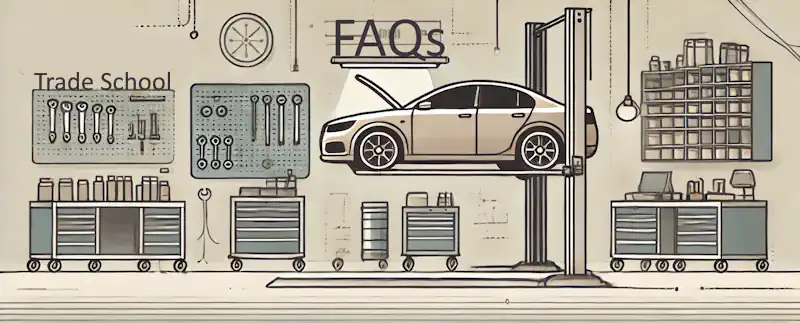![trade school faq cartoon depicting an automotive repair shop]()
Here's a comprehensive set of frequently asked questions to guide you through everything you need to know about trade schools. From
program options and costs to job prospects and earning potential, this FAQ covers the essential details to help you decide if a trade school might be the right choice for your career path.
[button link="https://toptrade.school/trade-school-finder/" type="big" color="green" newwindow="yes"] Connect with a School![/button]
Frequently Asked Questions About Trade School
1. What is a trade school?
- A trade school, also known as a vocational or technical school, is an educational institution that provides hands-on training and specialized instruction for specific skilled trades and careers, such as plumbing, welding, automotive repair, healthcare, IT, and more.
2. How is a trade school different from a traditional college?
- Unlike traditional colleges, trade schools focus on practical skills needed for a specific career rather than broader academic knowledge. Programs typically take less time to complete (months to two years) compared to a four-year college degree.
3. What programs do trade schools offer?
- Trade schools offer a variety of programs in fields like healthcare (medical assistant, dental hygienist), skilled trades (electrician, HVAC technician), technology (IT, cybersecurity), automotive, beauty (cosmetology, barbering), culinary arts, and more.
4. How long does it take to complete a trade school program?
5. What is the typical cost of attending a trade school?
- The cost varies widely by program and location but generally ranges from $5,000 to $30,000. Many trade schools offer financial aid options similar to colleges, including federal grants, scholarships, and loans.
6. Can I receive financial aid to attend a trade school?
- Yes, many trade schools are eligible for federal financial aid programs, including Pell Grants, student loans, and work-study. There are also specific scholarships available for students pursuing skilled trades.
7. Are there online trade schools?
- Some trade schools offer online courses, particularly for theoretical parts of the program. However, hands-on training often requires in-person attendance, especially for highly practical fields like welding or automotive repair.
8. What are the job prospects after attending a trade school?
- Many trades have high demand, especially in fields like healthcare, IT, construction, and mechanical trades. Skilled trades often offer competitive salaries, and many fields have a shortage of qualified workers, which can increase job opportunities.
9. How much can I expect to earn with a trade school education?
- Salaries vary by field and location. For example, electricians and HVAC technicians can earn between $40,000 to $80,000 annually, while roles in fields like IT or healthcare may offer even higher starting salaries. Additionally, many trades have opportunities for overtime and career advancement. Read this to see how pay for the trades increased in 2024.
10. Is a certification or license required to work in a trade?
- Most skilled trades require certifications or licenses, which may be earned through trade school programs. Requirements vary by state and profession. For example, electricians, plumbers, and healthcare workers often need state-issued licenses to practice.
11. What are the benefits of attending a trade school over traditional college?
- Trade schools typically have shorter programs, meaning you can enter the workforce more quickly. They also focus directly on job skills, offer good salary potential, and have lower tuition costs on average.
12. Are trade school credits transferable to a college if I want to pursue a degree later?
- While some credits may transfer, it depends on the program and institution. Certain fields, like nursing or IT, may have more flexibility in credit transfer than trades like welding or automotive repair.
13. Do trade schools offer job placement services?
- Many trade schools offer job placement services, such as career counseling, resume assistance, and interview preparation. Some schools have strong relationships with local employers and offer internships or apprenticeships.
14. What skills do I need to succeed in a trade school program?
- Practical, hands-on skills, problem-solving, attention to detail, and a willingness to work physically or technically demanding jobs are all beneficial. Different trades may require specific aptitudes (e.g., mechanical skills for automotive work or math skills for electrical trades).
15. How do I choose the right trade school and program?
- Consider your career interests, research job demand in your area, and look for accredited schools with good reputations. Visiting campuses, speaking with alumni, and reviewing program costs, financial aid, and placement rates can all help you in making a decision.
[button link="https://toptrade.school/trade-school-finder/" type="big" color="green" newwindow="yes"] Connect with a School![/button]
Click the button to connect with a trade school now.
More:
 Here's a comprehensive set of frequently asked questions to guide you through everything you need to know about trade schools. From program options and costs to job prospects and earning potential, this FAQ covers the essential details to help you decide if a trade school might be the right choice for your career path.
[button link="https://toptrade.school/trade-school-finder/" type="big" color="green" newwindow="yes"] Connect with a School![/button]
Here's a comprehensive set of frequently asked questions to guide you through everything you need to know about trade schools. From program options and costs to job prospects and earning potential, this FAQ covers the essential details to help you decide if a trade school might be the right choice for your career path.
[button link="https://toptrade.school/trade-school-finder/" type="big" color="green" newwindow="yes"] Connect with a School![/button]





